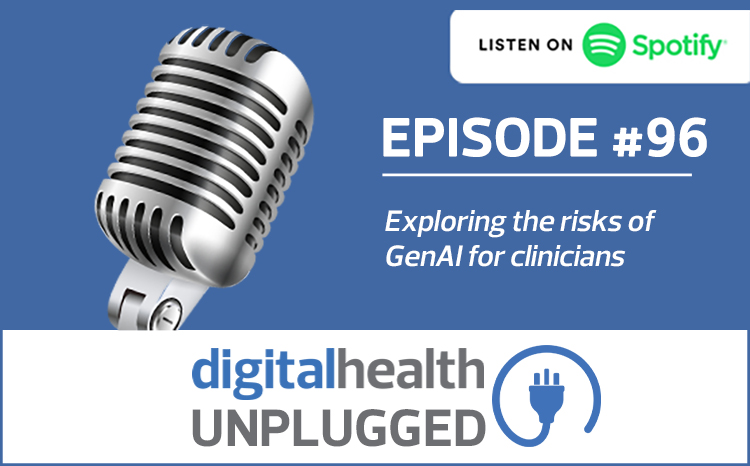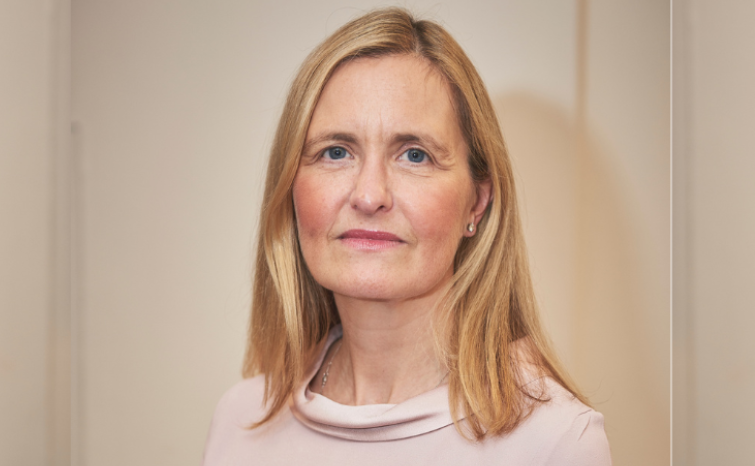Generative AI unleashing massive disruption in health
- 16 October 2023

How to harness, regulate and safely enable the use of generative AI in healthcare were central themes of this year’s HLTH conference in Las Vegas this week. Jon Hoeksma reports for Digital Health News
The annual US gathering of investors, VCs, and start-ups spans using digital technology to rethink delivery of all aspects of the vast US healthcare system, from supply chains, reimbursement, remote care, employee mental health, leadership, and equity. But time and again it was generative AI that was cited as the biggest technological disruptor.
Dozens of AI start-ups from across the globe were present at the HLTH show, ranging from AI for medical search and knowledge tools, disease specific models like the UK’s Skin Analytics, patient engagement tools, tools to extract meaning from unstructured medical notes like another UK start-up Pangaea Data, who received a grant at the event, and even an AI start-up dedicated to penis health. We may be approaching peak AI in health hype.
Pangaea Data founder Dr Vibhor Gupta said: “We are honored to receive the Digital Health Hub Foundation Grant for Best Use of AI in Health Tech.
“This is a testament to our commitment to improving patient outcomes by combining clinical guidelines and novel AI to enable a privacy-preserving, sustainable and scalable collaboration between healthcare and pharmaceutical industries by characterizing patients to find more undiagnosed and miscoded patients for 7,000 hard-to-diagnose conditions, leading to improved revenues and screening.”
AI and machine learning has been widely recognised as a key trend in health for years, but the advent of OpenAI has created a step-change on generative AI, with Microsoft’s co-pilot tools an example of how the technology is already in the mainstream.
March of generative AI in health
Less than a year since the general release of ChatGPT, the pace of innovation is bewilderingly fast with generative AI applications and large language models (LLM) for health being released on a near daily basis.
Few would argue that ChatGPT, with its tendency to ‘hallucinate’ false responses or make up sources, is ready for clinical use, but it is undoubtedly coming and already finding its way into many parts of healthcare, particularly admin and support functions.
Most strikingly, it is found in tools like Nuance’s DAX ambient note taking, which uses a mix of generative AI and Natural Language Processing to generate summary notes of patient consultations.
Entering mainstream EMR market
EMR market-leader Epic has already incorporated Chat GPT-based patient note summary and search functions into its software, under a high-profile partnership with Microsoft, with much more to come.
Dr David Rhew, Global CMIO Microsoft, speaking on a panel at HLTH, said that generative AI was particularly well suited to note summarisation and extracting meaning from large data sets, but only as a tool to support health professionals, and help them perform “at the top of their license”.
It’s about summarisation
“Generative AI is very good at summarisation and presenting back at different formats. The capability to pull things very quickly and present back opens up a lot of opportunities,” said Dr Rhew.
He spoke of the difficult challenges to safely regulate and assure AI in health. “It’s very different to past regulation, just because you can deploy safely into one environment you can’t be sure it will be the same in further environments and the model will change over time.”
Dr Brian Anderson, co-founder of the Coalition for Health AI (CHAI), established three years ago to help ensure AI is safely regulated in health, was less sanguine and described unregulated AI as a real danger to patients. “It’s the Wild West out there on generative AI,” he said.
“We have to come together in initiatives like CHAI and others because we are going to risk causing harm to patients.”
Bewildering speed of change
He stressed just how quickly the landscape has changed with the advent of generative AI: “An awful lot of solutions coming at lightning speed. In just six months the tech has moved very quickly.”
The conference saw the launch of VALID AI, an initiative to share knowledge and best practice on safely evaluating generative AI tools and LLM models.
Curb the cost of US healthcare
Across the conference the over-arching theme was the need to find technology solutions that can curb the burgeoning costs of the US healthcare system, which now costs $4.7 trillion annually and consumes 20% of GDP. The system is struggling to deal with staff shortages, clinician burnout, and massive differences in equity and access.
Many hope, and want to believe, that generative AI will provide tools that help address these huge challenges, particularly by improving the productivity of clinicians who have to spend ever growing amounts of time documenting care.
An example of how AI can help boost productivity was given by Dr John Halamka, president of the Mayo Clinic platform, who said that to cope with the 1500 emails he gets daily he now puts them through generative AI to summarise what people want. “What if we can make our admin 80% simpler using AI?” he asked.
But he stressed that its value was not in the abstract but in the specific, and depended on individual use cases. “You have to define the business and then look at how gen AI can help – even hallucinating generative AI.”
Too soon for clinical use
He added that generative AI remained in the very early stages and had yet to get approval for clinical use, with “a lot of people are not yet ready to hand over clinical flow or note taking to a non FDA 510 approved solution”.
Dr Jennifer Miles Thomas, president and CEO of Urology Virginia, said: “We need new tools that will help, as [we] are drowning on front line. But we also have to be very careful that we don’t give people a message that models will replace them, or that they are not valued.”
Mind the gap between rich and poor
One of the many challenges raised was how to ensure that the introduction of generative AI models doesn’t further entrench and exacerbate inequalities between rich and poor healthcare systems. There is concern that better resourced systems will have the ability to develop and deploy tools that their poorer counterparts won’t.
Dr Anderson noted: “It’s important when we think about use cases that high performing healthcare systems have, we also think about how do we help lower capability hospitals benefit too.”
The theme of transparency with patients was raised repeatedly on panels discussing how to guard against developing models that, by being trained on one patient group and demographic profile, fail to reflect the needs of others.
Win the trust of patients
Dr Anderson said transparency was a key principle of CHI. “In CHI we are including patient advocates at every working level. The ultimate targets of these models are our patients and we need ways to be transparent with them. How, for instance, can we inform our patients about where a model’s training took place?”
Dr Thomas argued that one of the most promising areas to introduce generative AI would be in access and triage of patients. He urged people to remember that they had to convince patients, many of whom were anxious or sceptical about AI in health. “A lot of people are not so educated about their health and what care they need,” he said.
“Crucially, that trust also has to exist with clinicians as well,” he added.
Dr Rhew spoke of the vital need for trust and transparency as essential foundations: “Trust is absolutely essential and has to do with transparency as well as intent. What are you doing to do with the data?”
Early productivity benefits
But despite the undoubted challenges, the experience of early adopters suggests the benefits are real. Atrium Health, the first adopter of DAX co-pilot, has been use by 125 clinicians over the past four months.
Dr Matt Anderson, senior medical director at Atrium Health, a health system spanning North and South Carolina, Georgia and Alabama, told Digital Health News: “Generative AI is enabling us to take better care of clinicians so they can take better care of patients. The data shows that they are saving 40 minutes a day per clinician.”
Learn more about how AI is reshaping the future of UK healthcare by joining us for the new Digital Health AI and Data conference and exhibition, 30-31 October, Business Design Centre, Islington





